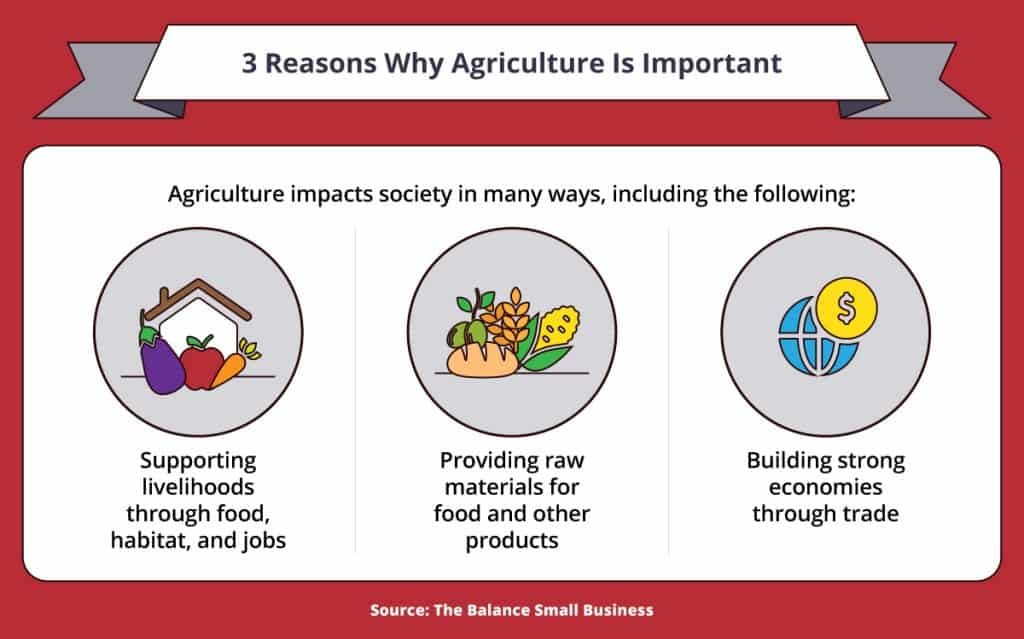When you think about agriculture, you might picture vast fields of crops or livestock grazing in the countryside. But agriculture is much more than just a picturesque scene. It plays a crucial role in our society, providing us with food, supporting the economy, and promoting sustainable development. In this article, we will explore why agriculture is important and how it impacts various aspects of our lives.
Agriculture is important because it provides food, supports the economy, and promotes sustainable development.
1. Ensuring Food Security
1.1 Meeting the global demand for food
With a growing global population, the demand for food is constantly increasing. Agriculture plays a vital role in meeting this demand by producing a wide variety of crops and livestock. From staple crops like rice, wheat, and corn to fruits, vegetables, and meat, agriculture provides us with the essential nutrients we need to survive and thrive.
1.2 Reducing hunger and malnutrition
Unfortunately, hunger and malnutrition are still prevalent issues in many parts of the world. Agriculture plays a crucial role in reducing these problems by ensuring a steady supply of nutritious food. By improving agricultural practices and increasing productivity, we can address food insecurity and improve the overall health and well-being of communities.
1.3 Supporting population growth
As the global population continues to grow, agriculture becomes even more important. It not only provides food for the current population but also supports future generations. By investing in sustainable agricultural practices and technologies, we can ensure that there is enough food to feed the growing population without depleting our natural resources.
2. Economic Importance
2.1 Job creation and income generation
Agriculture is a significant source of employment and income for millions of people worldwide. From farmers and farm workers to food processors, distributors, and retailers, the agricultural sector creates a wide range of job opportunities. By supporting agriculture, we can stimulate economic growth, reduce unemployment, and improve livelihoods.
2.2 Contribution to GDP
The agricultural sector also makes a significant contribution to the Gross Domestic Product (GDP) of many countries. It not only generates income but also drives economic development in rural areas. By investing in agricultural infrastructure and supporting farmers, we can boost economic growth and reduce regional disparities.
2.3 Export opportunities
Agricultural products are not only consumed domestically but also exported to other countries. This creates valuable export opportunities and contributes to foreign exchange earnings. By promoting agricultural exports, countries can strengthen their economies and improve their trade balance.
3. Environmental Sustainability
3.1 Conservation of natural resources
Agriculture relies on natural resources such as land, water, and biodiversity. It is essential to manage these resources sustainably to ensure their long-term availability. By adopting practices like crop rotation, soil conservation, and water management, we can protect and preserve these valuable resources for future generations.
3.2 Biodiversity preservation
Agricultural activities can have a significant impact on biodiversity. However, when managed sustainably, agriculture can also contribute to biodiversity preservation. By promoting agroforestry, organic farming, and the preservation of natural habitats, we can create a harmonious balance between agriculture and biodiversity conservation.
3.3 Climate change mitigation
Climate change is one of the most pressing challenges of our time. Agriculture can play a crucial role in mitigating climate change by reducing greenhouse gas emissions and sequestering carbon. By adopting climate-smart agricultural practices, such as agroecology and precision farming, we can minimize the environmental impact of agriculture and contribute to climate change mitigation efforts.
4. Rural Development
4.1 Poverty reduction
Agriculture is often the main source of income for rural communities, especially in developing countries. By investing in agricultural development and providing support to small-scale farmers, we can reduce poverty and improve the living conditions of rural populations. This, in turn, can contribute to overall economic growth and social stability.
4.2 Infrastructure development
Agricultural development goes hand in hand with infrastructure development. Improved roads, irrigation systems, and storage facilities are essential for efficient agricultural production and distribution. By investing in rural infrastructure, we can enhance agricultural productivity, reduce post-harvest losses, and improve market access for farmers.
4.3 Empowering local communities
Agriculture has the power to empower local communities by providing them with the means to sustain themselves. By supporting small-scale farmers, promoting agricultural cooperatives, and facilitating access to markets, we can empower local communities and enable them to take control of their own development.
5. Innovation and Technological Advancements
5.1 Improving agricultural practices
Advancements in technology have revolutionized the agricultural sector. From precision farming and automated machinery to genetic engineering and biotechnology, innovation has improved agricultural practices and increased productivity. By embracing these technological advancements, we can further enhance agricultural efficiency and sustainability.
5.2 Enhancing productivity and efficiency
Efficiency is crucial in agriculture to meet the growing demand for food while minimizing resource use. By adopting modern farming techniques, such as drip irrigation, integrated pest management, and data-driven decision-making, we can enhance productivity and reduce waste. This not only benefits farmers but also ensures a more sustainable and resilient food system.
5.3 Promoting sustainable farming methods
Sustainability is at the core of modern agriculture. By promoting sustainable farming methods, such as organic farming, agroecology, and permaculture, we can minimize the use of synthetic inputs, protect the environment, and promote biodiversity. These practices also contribute to healthier and more nutritious food for consumers.
In conclusion, agriculture is important for a multitude of reasons. It ensures food security, supports the economy, promotes environmental sustainability, drives rural development, and fosters innovation. By recognizing the importance of agriculture and investing in its development, we can build a more resilient and sustainable future for generations to come.
Originally posted 2023-07-18 19:11:57.




